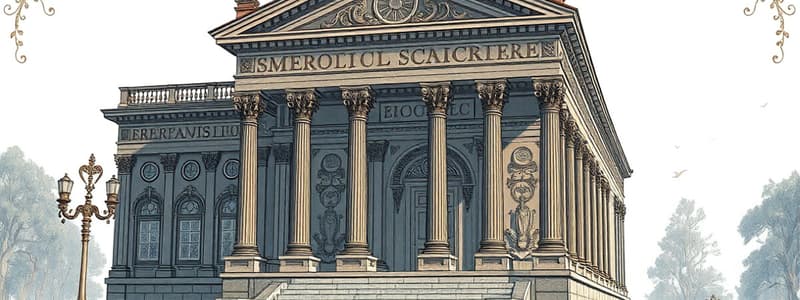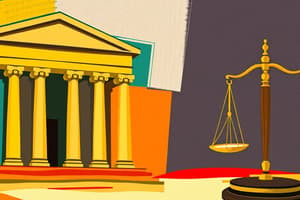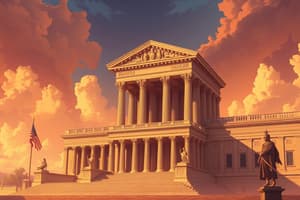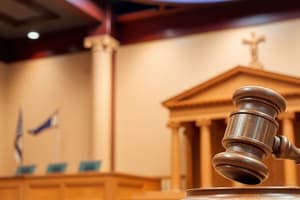Podcast
Questions and Answers
What is the process called when the Court can declare a Legislative or Executive act unconstitutional?
What is the process called when the Court can declare a Legislative or Executive act unconstitutional?
- Appeal
- Verdict
- Precedent
- Judicial Review (correct)
What defines a Jury Trial?
What defines a Jury Trial?
- A trial decided by a judge only
- A trial without a witness
- A trial where juries make findings of fact (correct)
- A trial that deals with federal law only
Which jurisdiction involves cases that arise under federal law?
Which jurisdiction involves cases that arise under federal law?
- Federal Jurisdiction (correct)
- Concurrent Jurisdiction
- State Jurisdiction
- Appellate Jurisdiction
Which of the following statements is true about Civil Cases?
Which of the following statements is true about Civil Cases?
How many justices compose the highest court in the United States?
How many justices compose the highest court in the United States?
What is the role of the Chief Justice?
What is the role of the Chief Justice?
What is the difference between State Courts and Federal Courts?
What is the difference between State Courts and Federal Courts?
What is meant by Appellate Jurisdiction?
What is meant by Appellate Jurisdiction?
What is the primary role of state courts?
What is the primary role of state courts?
Who is responsible for nominating Supreme Court Justices?
Who is responsible for nominating Supreme Court Justices?
What was the significance of McCulloch v. Maryland?
What was the significance of McCulloch v. Maryland?
In which case did the Supreme Court declare an act of Congress unconstitutional for the first time?
In which case did the Supreme Court declare an act of Congress unconstitutional for the first time?
What doctrine was upheld in Plessy v. Ferguson?
What doctrine was upheld in Plessy v. Ferguson?
What was the outcome of Brown v. Board of Education?
What was the outcome of Brown v. Board of Education?
What is the primary function of the Judicial Branch?
What is the primary function of the Judicial Branch?
What was the central issue in Gideon v. Wainwright?
What was the central issue in Gideon v. Wainwright?
What was the main argument presented by Gideon in his habeas corpus petition?
What was the main argument presented by Gideon in his habeas corpus petition?
What significant ruling was established in Loving v. Virginia?
What significant ruling was established in Loving v. Virginia?
What did the Supreme Court decide in Tinker v. Des Moines?
What did the Supreme Court decide in Tinker v. Des Moines?
What precedent did Kennedy v. Bremerton set regarding public school staff?
What precedent did Kennedy v. Bremerton set regarding public school staff?
What outcome resulted from NCAA v. Alston?
What outcome resulted from NCAA v. Alston?
What was established by Korematsu v. U.S. regarding Japanese-Americans during World War II?
What was established by Korematsu v. U.S. regarding Japanese-Americans during World War II?
What principle was underscored in Texas v. Johnson regarding freedom of speech?
What principle was underscored in Texas v. Johnson regarding freedom of speech?
What does TLO v. New Jersey state about searches in schools?
What does TLO v. New Jersey state about searches in schools?
Flashcards
Judicial Review
Judicial Review
The power of a court to review laws and executive actions to determine if they are constitutional.
Precedent
Precedent
A legal decision made in a similar case that guides future decisions.
Verdict
Verdict
The official decision of a court in a case.
Criminal Case
Criminal Case
Signup and view all the flashcards
Civil Case
Civil Case
Signup and view all the flashcards
Federal Jurisdiction
Federal Jurisdiction
Signup and view all the flashcards
Supreme Court
Supreme Court
Signup and view all the flashcards
Chief Justice
Chief Justice
Signup and view all the flashcards
State Courts
State Courts
Signup and view all the flashcards
How are Supreme Court Justices Selected?
How are Supreme Court Justices Selected?
Signup and view all the flashcards
The role of the Judicial Branch
The role of the Judicial Branch
Signup and view all the flashcards
McCulloch v. Maryland
McCulloch v. Maryland
Signup and view all the flashcards
Marbury v. Madison
Marbury v. Madison
Signup and view all the flashcards
Plessy v. Ferguson
Plessy v. Ferguson
Signup and view all the flashcards
Brown v. Board of Education
Brown v. Board of Education
Signup and view all the flashcards
Gideon v. Wainwright
Gideon v. Wainwright
Signup and view all the flashcards
Habeas Corpus
Habeas Corpus
Signup and view all the flashcards
Freedom of Speech
Freedom of Speech
Signup and view all the flashcards
Freedom of Assembly
Freedom of Assembly
Signup and view all the flashcards
Interracial Marriage
Interracial Marriage
Signup and view all the flashcards
Public School Staff Religion
Public School Staff Religion
Signup and view all the flashcards
Name, Image, and Likeness (NIL)
Name, Image, and Likeness (NIL)
Signup and view all the flashcards
Japanese-American Internment
Japanese-American Internment
Signup and view all the flashcards
School Searches
School Searches
Signup and view all the flashcards
Study Notes
Judicial Branch Review
- Judicial Review: The ability of the Court to declare a Legislative or Executive act as unconstitutional.
- Precedent: An earlier event or action used as a guide in similar circumstances.
- Verdict: A decision in a civil or criminal case or inquest.
- Evidence: Facts or information supporting a belief or proposition's validity.
- Appeal: A serious or urgent request, typically to the public.
- Jury Trial: Trials allowing juries to determine facts and render verdicts.
- Federal Jurisdiction: Cases arising under federal law.
- State Jurisdiction: Cases involving events in the court's location or where defendants reside.
- Concurrent Jurisdiction: Cases that can be heard in either federal or state courts.
- Appellate Jurisdiction: The ability to hear a case for a second consideration, typically for a defendant after a criminal case.
- Supreme Court Jurisdiction: Cases affecting ambassadors, public ministers, consuls, or disputes.
Criminal vs. Civil Cases
- Criminal Case: Involves a crime, and criminal penalties are applied, including jail time or execution.
- Civil Case: A violation of someone's rights causing harm, and results in fines or legal actions but not jail time.
Supreme Court
- Supreme Court: The highest court in the country.
- Justices (Supreme Court): There are nine justices.
- Chief Justice: The head of the Supreme Court; currently, John Roberts, Jr.
- Selection of Justices: Nominated by the president and confirmed by the Senate.
State vs. Federal Courts
- State Courts: Deal with general jurisdiction cases not exclusively federal. State courts interpret state laws.
- Federal Courts: Deal with cases specifically assigned. These courts interpret federal laws.
Supreme Court Cases
- McCulloch v. Maryland: The federal government has power to set up a bank and states cannot tax it.
- Marbury v. Madison: Established the Supreme Court's power of judicial review ( deciding whether laws or acts are constitutional.)
- Plessy v. Ferguson: Upheld "separate but equal" segregation (racial segregation).
- Brown v. Board of Education: Declared state-sponsored segregation in public schools unconstitutional.
Studying That Suits You
Use AI to generate personalized quizzes and flashcards to suit your learning preferences.




